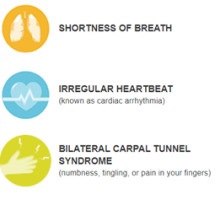Sponsored content provided by Pfizer
For rare diseases such as transthyretin amyloid cardiomyopathy (ATTR-CM), caregivers play an incredibly important role in not only providing support, but also helping loved ones reach an accurate diagnosis and disease management.
The Early Signs and Symptoms of ATTR-CM
Most people are familiar with common types of heart disease and related symptoms like irregular heartbeat, pain in the chest and fatigue. A lesser-known cause of heart failure, ATTR-CM, is a rare, underdiagnosed and life-threatening condition that can cause seemingly random, unresolved health issues such as shortness of breath, irregular heartbeat and/or carpal tunnel syndrome. Given the shared common symptoms with other causes of heart failure, it can be especially difficult to diagnose ATTR-CM.

Caregivers like you are crucial in helping to receive a correct and early diagnosis of ATTR-CM because you are close to your loved ones and may notice things that they do not. Observing these symptoms and attending doctor appointments can help them to better communicate symptoms with their cardiologist, remember details and ultimately receive a correct diagnosis. This is crucial to helping them manage their condition.

Real World Example: Support During the Diagnosis Process
Jackie is a caregiver for her husband Don, and it’s important to her to be a proactive advocate by attending Don’s doctor appointments, observing his symptoms and keeping detailed records and notes: “Because the symptoms are so varied, I do think as a caregiver you have to participate. You have to be there. You have to show up. You have to take notes. I bring dates. And maybe I’m a little pushy about it, but sometimes when Don is reticent, I’m there to speak up.”

Faye was a caregiver for her father for years until he passed away from the hereditary form of ATTR-CM (hATTR-CM). When she received the same diagnosis at 44 years old, she credited her husband and caregiver, Brad, for getting her through her diagnosis of ATTR-CM and helping to manage her disease and stay positive: “I couldn’t do it by myself. I couldn't walk this journey without him.”

The Importance of Caregiver Support
Helping someone to record symptoms and receive an accurate diagnosis is just the start. A caregiver is a crucial part of helping someone to manage their condition and symptoms as well as providing essential mental and emotional support as they navigate this complex time.
The journey is not an easy one, but there are resources available to help support you and your family through this. You can create your own customized guide to help you prepare for the next doctor visit or find support groups at For Caregivers | Your Heart's Message | Official Site (yourheartsmessage.com).
Helpful Resources
Visit the HFSA Patient Hub to explore tools and resources to help patients stay healthy while living with heart failure.
View Heart Failure Awareness 365 activities to stay up-to-date on tips for healthy living for people living with heart failure.
